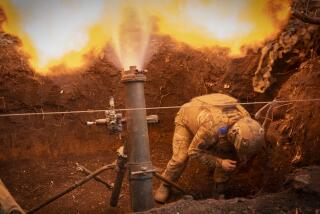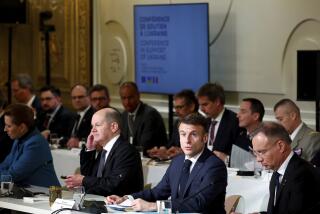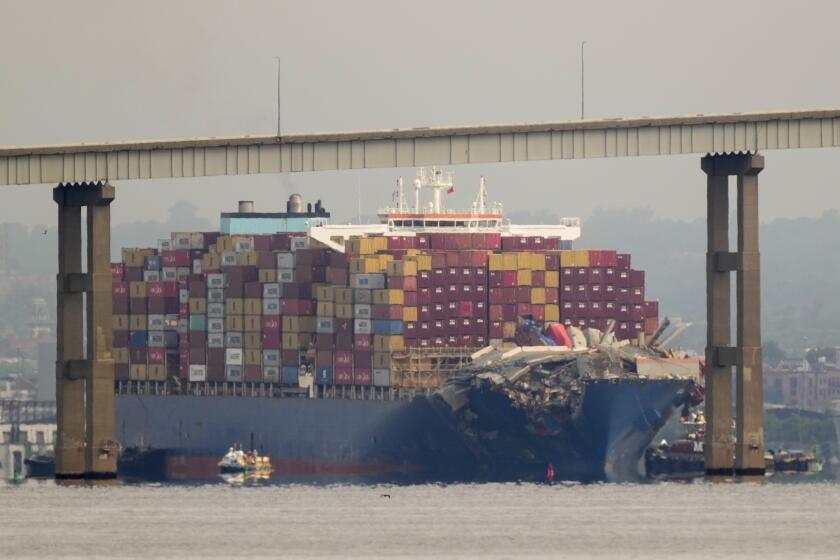U.S. Warns of Security Threat in Yugoslav War : Balkans: Scowcroft signals that the Administration is inching toward possible military intervention.
In a signal that the Bush Administration is inching toward possible military intervention in Yugoslavia, National Security Adviser Brent Scowcroft said Monday that the conflict in the Balkans could soon become a threat to the security of the United States and its European allies.
“It’s already out of control. . . ,” Scowcroft said of the war among the former Yugoslav republics. “As the conflict goes on and defies attempts at solution, the risks of it directly impinging on the interests of the Euro-Atlantic community increase.”
Scowcroft, addressing a forum of U.S. and European officials and experts, said the United States still hopes that the Serbs and Bosnians fighting around Sarajevo will agree to a cease-fire and allow a United Nations peacekeeping force to secure the city. And he refused to forecast what the Administration would do if it becomes clear that no cease-fire is possible.
But his comments reflected a gradual shift in the thinking of Administration officials, who earlier insisted that the fighting in the former Yugoslavia did not affect U.S. national security interests and virtually ruled out military action, even as part of a multinational force.
Other officials said that Scowcroft and aides have been preparing options, including U.S. participation in a multinational military force, for President Bush to consider if the current U.N. effort fails.
A White House official described the internal discussions as “very intensive” and said they include options for the use of U.S. air power to protect a multinational force that would open the Sarajevo airport for relief shipments. Still, he added, “The situation is so fluid it’s hard to resolve.”
Senate Minority Leader Bob Dole (R-Kan.), meanwhile, called on the Administration and its North Atlantic Treaty Organization allies in Europe to put jet fighters into the air over Bosnia to protect relief convoys, authorize the use of troops on the ground to stop Serbian attacks and issue an ultimatum to Serbia to halt the fighting.
“We are confronted with the fact of a bloody conflict and the possibility of a broader war on NATO’s doorstep,” Dole said. “The bottom line is (Serbian leader Slobodan) Milosevic must be stopped now.”
Both Dole and Scowcroft were addressing a joint meeting of the Euro Group, consisting of representatives from the European members of NATO and the Atlantic Council, a bipartisan public policy institute here.
Scowcroft, speaking slowly and pensively, made it clear that the Administration has not yet made up its mind--but also made it clear that military intervention has not been ruled out.
“Yugoslavia is a painful case study for all of us. . . ,” he said. “On the one hand, there is the trepidation of involvement in the stickiest kind of conflict possible. On the other, there is the painful vision of slaughter going on while we all stand aside and watch. I don’t really know what the answer is here.
“I think we need to recognize that not every conflict in the world has to be taken on by multilateral institutions. . . ,” Scowcroft said. “But the Balkans are the Balkans, and Sarajevo has a history that we should forget only at our peril.”
World War I was touched off by the assassination of Austrian Archduke Franz Ferdinand in Sarajevo in 1914.
Scowcroft added that neighboring Albania, Bulgaria and Greece could all become embroiled in the war and noted that the world’s Islamic countries are becoming increasingly concerned about Bosnia’s large Muslim population.
Scowcroft’s comments echoed similar remarks by Secretary of State James A. Baker III over the weekend. “No one has ruled out the possibility of some sort of multilateral (military) engagement,” Baker said in an interview with Cable News Network.
The secretary of state said that U.N. economic sanctions against Serbia should be given more time to work. But if the sanctions fail, he said, “some sort of multilateral pressure” might be applied.
A State Department aide said that high officials have been growing increasingly angry over Serbia’s refusal to enforce a cease-fire.
Serbian guerrillas around Sarajevo “have their artillery sitting in open fields, without any attempt at concealment,” he said. That would make the big guns vulnerable to a foreign air strike, he said, but “The Serbs seem to have the attitude that nothing is going to happen.”
Congressional aides noted that Dole is one of several influential members of the Senate who have been urging the Administration to consider military intervention--but that they remain in a decided minority.
Senate Foreign Relations Committee Chairman Claiborne Pell (D-R.I.), Armed Services Committee Chairman Sam Nunn (D-Ga.), and Sens. Richard G. Lugar (R-Ind.), Joseph I. Lieberman (D-Conn.) and Carl Levin (D-Mich.) have all demanded a more active U.S. policy.
“It is time to draw another line--this time a line in the Balkans--and to say that Milosevic’s aggression will not stand,” Lieberman said earlier this month.
Lugar, an influential voice in foreign affairs, has urged the Administration to begin contingency planning for the dispatch of U.S. forces to Bosnia under a United Nations and NATO umbrella.
Lugar, however, admitted that many senators still share the Administration’s caution about intervention in Bosnia, where the military situation is liable to be far more complex than it was in Kuwait.
“The senators I talk to are all agonizing over the humanitarian problems there, over the number of people who are starving, but the majority are, to say the least, cautious about authorizing the use of force and the follow-up U.S. role,” Lugar said in an interview Monday.
“A lot of people are telling me that they admire my leadership on this issue but that they are not sure they are ready to follow me over the hill,” he added.
The Senate has already passed a non-binding resolution, sponsored by Levin, urging the United Nations to consider military intervention in Yugoslavia. But a use-of-force resolution similar to the one that Congress passed on the eve of the Persian Gulf War would have a tough time passing unless it became clear that the Europeans, through NATO, were willing to take the lead in any military intervention that might ensue, a senior Foreign Relations Committee aide said.
“This is going to be a real test for NATO and whether it is going to be anything more than a chowder and marching society in years to come,” the source added. “If NATO cannot respond to this crisis, then the people around here who appropriate the money are going to start asking themselves why we are spending so much on the organization.”
More to Read
Start your day right
Sign up for Essential California for news, features and recommendations from the L.A. Times and beyond in your inbox six days a week.
You may occasionally receive promotional content from the Los Angeles Times.







